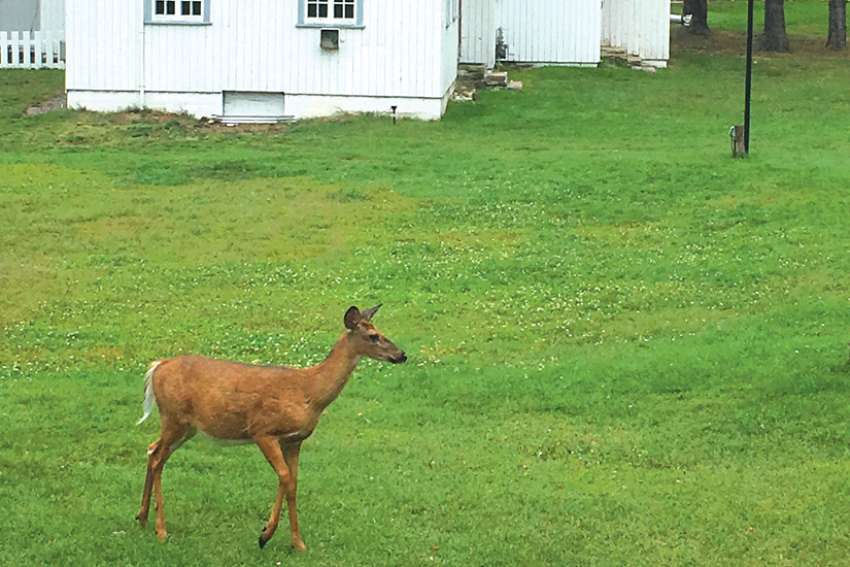But ask the animals, and they will teach you;
The birds of the air, and they will tell you;
Ask the plants of the earth, and they will teach you;
And the fish of the sea will declare to you.Job: 12, 7-8
St. Mary’s University in Calgary is situated on a sprawling 35-acre property adjacent to Fish Creek Park, the largest urban provincial park in Canada. As a result, our campus is often teaming with wildlife, and here I don’t just mean student parties.
Rather, on a typical day, it is not unusual to navigate around grazing deer, to watch coyotes hunting the ground, squirrels that thrive in great abundance or to observe the occasional bobcat as it makes its way across campus in the early, still morning.
Above us the campus teems with birds, including a majestic family of hawks who similarly feast on the abundant wildlife below. One such osprey, who perches above my office window, was immortalized on our Coat of Arms. I used to joke that his daily hunting ritual was an unfortunate metaphor for the president’s office.
One of the great advantages of our location is that it allows our booming Biology degree to program real-world, in-field research and study. And so, along with the wildlife, it is also not unusual to find our students planting a medicine garden, investigating traditional prairie grasses or even collecting samples of microscopic tardigrades — water bears — which one of our professors once sourced for a NASA mission experiment.
Close by is a Blackfoot Buffalo Pound, and so many of our Indigenous programs include land-based learning, often beginning in and around our tipi.
One of the impacts of having the campus shuttered for the last year and a half has been a gradual movement of the wildlife onto the campus proper, where once they confined themselves to the peripheries, and only moving on site to graze in the early morning or late evening. Indeed, the absence of human traffic saw an explosion of activity reminding us just how close by our natural world has always been.
Similar stories of animal incursions into urban areas have grown during the pandemic. Extraordinary photos have surfaced of mountain goats taking over Welsh streets, Banff roads filled with unusually high volumes of elk, foxes overtaking Israeli suburbs and deer roaming parks and roads in Japan.
These interactions, of course, are not always optimal. Conflict between predatory animals and humans have led to creatures being euthanized. On the positive side, there has been a measurable improvement to animal health and safety, with a dramatic drop in road kills, for example, with one study showing as much as a 40-per-cent reduction in animal road-related deaths in Eastern Europe alone due to diminished traffic. Sonar studies have shown a significant uptick in marine life populations in the absence of boat movements, while bird life has similarly benefited from a decrease in civil aviation.
All this reminds us how interconnected our planet is — for good and bad — and what an important role each of us plays in maintaining the circle of life.
This is exactly the point that Pope Francis makes in his ground-breaking encyclical Laudato Si’ — a cri de coeur for the environment and a call to arms for human accountability. Our coordinator of Social Justice and Catholic Studies, Dr. Timothy Harvie, has focused much of his research on animal ethics and the critical importance of redrawing our relationship to the natural world.
As Dr. Harvie puts it, “An economy that treats natural life and the stock of the Earth as mere instruments of human consumption bifurcates reality into two categories: humanity and that which humans consume. Such a division neglects the shared evolutionary history and ongoing interrelationships which illuminate the interconnectedness of life within the Earth.”
Pope Francis also reminds us: “We have only one heart, and the same wretchedness which leads us to mistreat an animal will not be long in showing itself in our relationships with other people. Every act of cruelty towards any creature is contrary to human dignity.”
If we have learned something during this difficult time on our planet — including in Ukraine today — it is that everything is connected. Neglecting one link on the chain inevitably impacts all the others. If we are to flourish in our wounded world, we need to pay more attention to our responsibilities, to reach out to and support our brothers and sisters, and honour the circle of life.
(Turcotte is president of St. Mary’s University in Calgary.)


